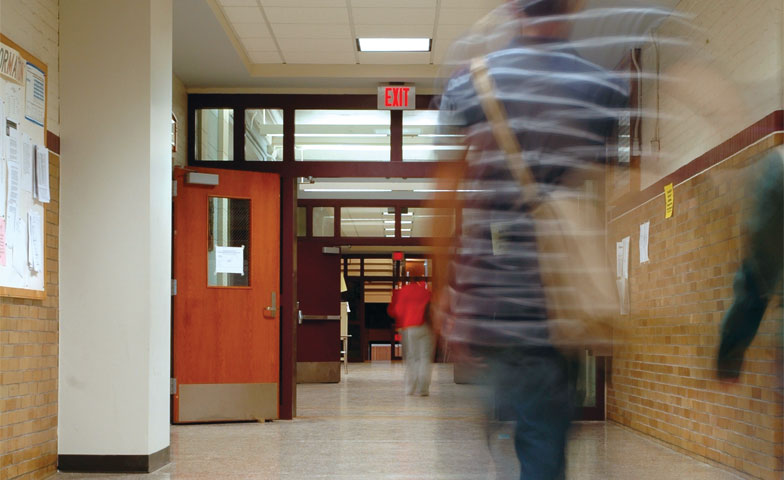Middle grades educators spend almost all their time and energy dealing with what is taught, the content that is presented in classrooms and courses. This is understandable, given the great attention placed on cognitive learning/academic achievement.
But the school is so much more than a physical facility in which teachers present lessons; it is a laboratory of living where ongoing practices and relationships educate. Educators should stop every now and then to consider the lessons the school may be teaching via its programs, policies, rules, and regulations—by its way of life. When doing so, they may be surprised—and chagrined.
A discouraging percentage of what is taught explicitly in the formal curriculum is forgotten in a matter of months. This is a recognized and accepted reality. But the lessons that the school teaches implicitly remain, because they become internalized, subtly but certainly, as students over time live under the school’s tutelage.
William Heard Kilpatrick, often considered America’s greatest teacher, claimed, “We learn what we live, and we learn it to the degree that we live it.” And noted educator Eliot Eisner wisely reminded us that “Schools teach much more—and much less—than they intend to teach.”
Much of the “more” that the school unintentionally teaches is positive, and an entire article or two might well be given over to acknowledging and elaborating on the significant, life-changing lessons individual teachers transmit just by being in relationships with students. Indeed, when all is said and done, the influence that the teacher as a person has on the attitudes, values, and behavior of a student may be the most certain and significant “take-away” from a year spent in that teacher’s classroom.
The Hidden Curriculum
Fortunately, even though newspaper stories about education seem to be concerned exclusively with reporting on the cognitive side of an education as indicated by test scores—as if that were all a real education was about—most parents do recognize and appreciate the impact that a teacher has on a student apart from the formal cognitive lessons.
However, a good many of the lessons unintentionally taught by the school run completely counter to a school’s stated objectives and to the middle school philosophy. It is those undesirable lessons, part of the hidden curriculum, that a faculty needs to recognize, think about, and then consider a way to down-play or counter. Many of these lessons evolve from long-standing practices that are deeply ingrained in our culture and cannot be altered immediately or easily. However, by being conscious of these undesirable lessons being taught, teachers can help students understand the background of practices and gain a needed perspective.
For example, consider the undesirable lessons inherent in most schools’ grading systems. Doesn’t our uniform, single-standard grading scale run counter to our purported goal of helping all students build a positive self-concept? What conclusion can some students come to when time after time they are expected to excel where all their prior school experiences have demonstrated they cannot possibly place in the top group?
What does the heavy emphasis on grades lead students to conclude about the goal of education? When you stop and think about it, you must recognize that a school via its grading practices actually teaches some kids that they are dumb!
Although it certainly isn’t a school’s intention, ability grouping practices inevitably teach some undesirable lessons. They teach that some kids are worth more than others. When some students are identified as “gifted,” and dealt with in special ways, all other students automatically become “non-gifted”—a label we don’t want to place on students who are in the process of becoming.
Consider also a school’s typical discipline code and policy. Isn’t it based on negative assumptions about the nature of young adolescents? Doesn’t it specify consequences for assumed misbehavior rather than confirm positive expectations? Does it often encourage kids to learn ways to beat the system? Do students learn, regrettably, that adults don’t trust them?
Food for Thought
In almost all middle schools, we must face the unfortunate truth that lessons that conflict with the school’s commitment to providing the best developmentally responsive education possible for all students are inadvertently being taught. The ways we manage, sort, label, instruct, and assess students convey messages. We know that during these malleable early adolescent years, youth are developing the self-concepts and personal standards, values, and attitudes that will direct their behavior in the years ahead, so it does seem most important that the undesirable lessons the school teaches should be faced and educators should take actions to counter them.
Think about it. Consider taking time in team meetings and faculty sessions to tackle this important issue.
John H. Lounsbury is a long-time middle level advocate and dean emeritus of the John H. Lounsbury College of Education at Georgia College and State University, Milledgeville, Georgia.He is a featured presenter at AMLE2014. john.lounsbury@gcsu.edu
